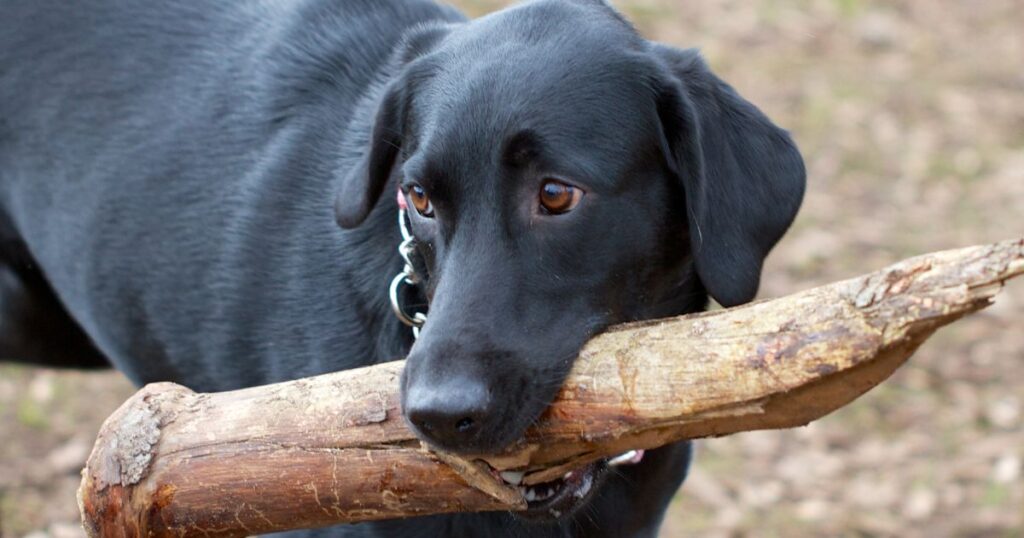
Labrador puppies are a popular choice for families due to their friendly and smart nature. However, a common challenge that new puppy owners face is dealing with puppy biting. It’s important to recognize that biting is a natural behavior for puppies, and it’s not a sign of aggression or misbehavior. During the early stages of a Labrador puppy’s life, they use their mouths to explore the world around them. They may chew on objects, bite, or nip as a way to play, interact, and show affection towards their owners. While this behavior may seem harmless initially, it’s crucial to teach your puppy not to bite or nip at people or other animals to prevent potential harm and unwanted habits as they grow older. To tackle this issue, it’s beneficial to understand how to discourage biting and encourage positive behavior. Through positive reinforcement and early training, pet owners can build a strong relationship with their Labrador puppies and prevent biting from becoming a persistent issue. Biting behavior typically starts during the puppy’s early developmental stages, as they learn to interact with their environment and discover their boundaries. By addressing this behavior early on and implementing effective training techniques, owners can help their Labrador puppies develop into well-behaved and gentle companions.
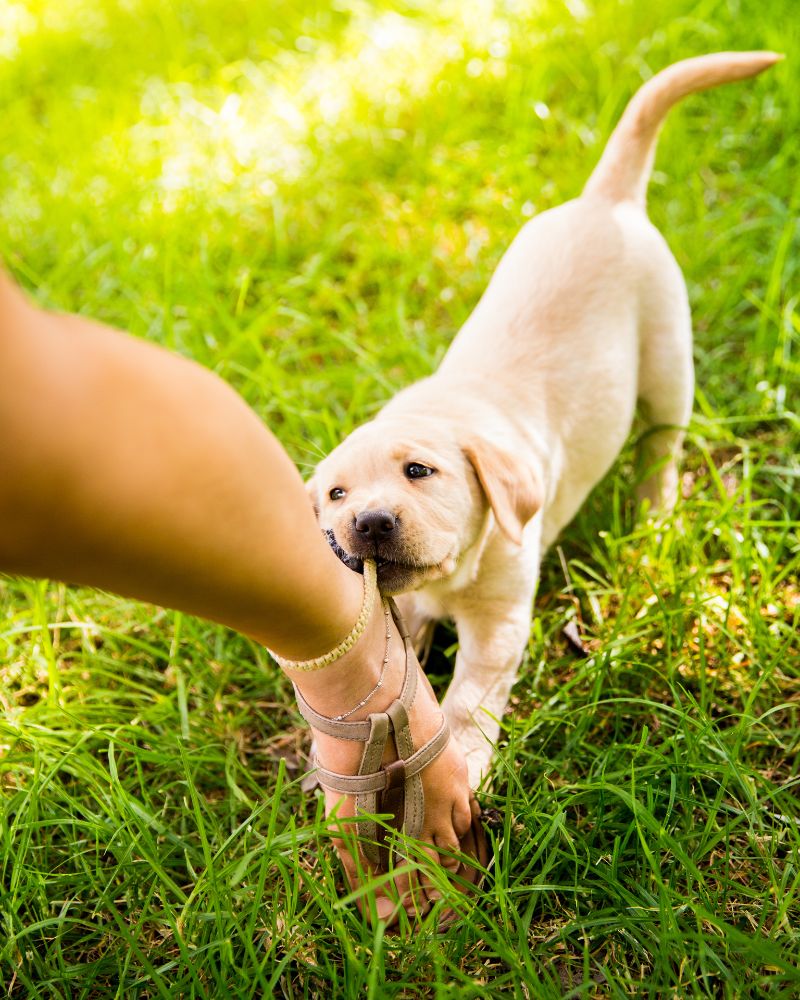
Labrador puppies, just like all puppies, have a tendency to start biting at a young age. This behavior usually begins when they are only a few weeks old and is a way for them to explore their surroundings. By using their mouths, they can interact with different textures and tastes in their environment. The biting and gnawing that puppies engage in also helps with their teething process. Lab puppies typically get their adult teeth between 12 to 16 weeks of age, which can cause some discomfort in their gums. This discomfort may lead to an increase in biting as puppies try to ease their gum pain during this teething period. To address puppy biting and encourage good habits, it is essential to start bite inhibition training early on. This can involve redirecting their biting behavior to suitable chew toys and rewarding gentle behavior. Remember, puppy biting is a normal part of their growth and development. As Lab puppies grow and get their adult teeth, their biting behavior should lessen. While Lab puppies, just like all puppies, usually go through a biting phase, this does not mean they will grow up to be aggressive individuals. With proper training and socialization, Lab puppies can learn appropriate bite inhibition and decrease their biting tendencies as they mature. If your Labrador puppy is biting a lot, it could be due to various reasons, such as playfulness, fear, or teething. Understanding why your puppy is biting and addressing those issues with patience and training can help guide them towards becoming well-behaved adult dogs. In instances where a Lab puppy is biting your children, it is important to address the behavior promptly. By correcting their behavior with a gentle “no” and redirecting their attention to toys, you can help discourage biting directed towards people. Additionally, addressing any fear or stress factors and providing a secure environment can help reduce biting behaviors. Teething can also contribute to increased biting in Lab puppies. Offering appropriate chew toys for them can help satisfy their chewing needs and reduce biting directed towards people. Overall, with proper training, patience, and understanding, Lab puppies can learn to minimize their biting tendencies and grow into well-behaved adult dogs.
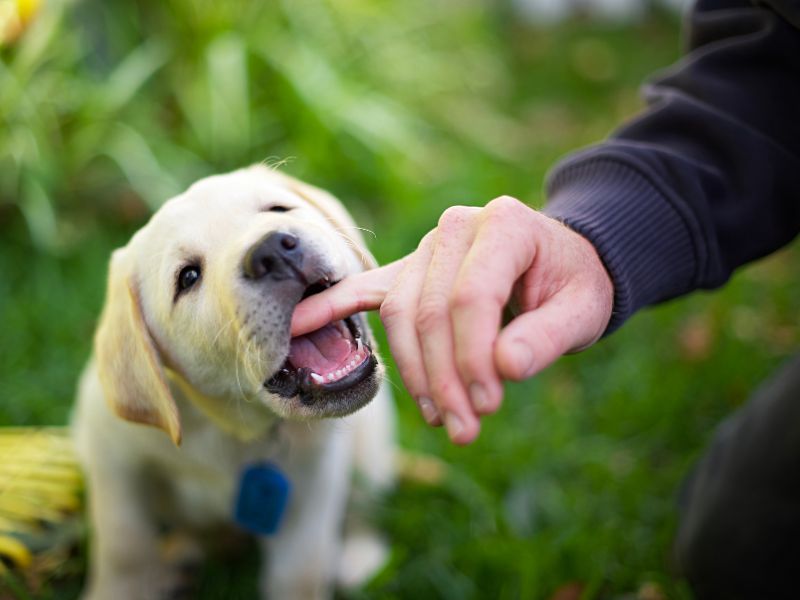
Labrador puppies are known for their playful and inquisitive nature, which often involves using their mouths to explore and learn. Although it may seem like they bite a lot, this behavior is completely normal for puppies. One reason why Lab puppies bite so much is due to teething. As they grow their adult teeth, they experience discomfort in their gums, leading them to chew and bite to alleviate the pain. Chewing helps soothe their gums, making it a natural response to teething. Additionally, Lab puppies also bite during play to engage and interact with their littermates. This playful biting helps them develop important social skills like communication and setting boundaries. Through play-biting, they also learn bite inhibition, which teaches them to control their bite strength and pressure. Occasionally, Lab puppies may bite out of fear or aggression when they feel threatened or unsafe. While these instances are rare compared to playful biting, it is essential to address and correct this behavior promptly to prevent escalation. Understanding why your Labrador puppy bites is the first step in managing and addressing this normal developmental behavior effectively. With guidance, patience, and training, your puppy will learn appropriate ways to explore and interact without excessive biting.
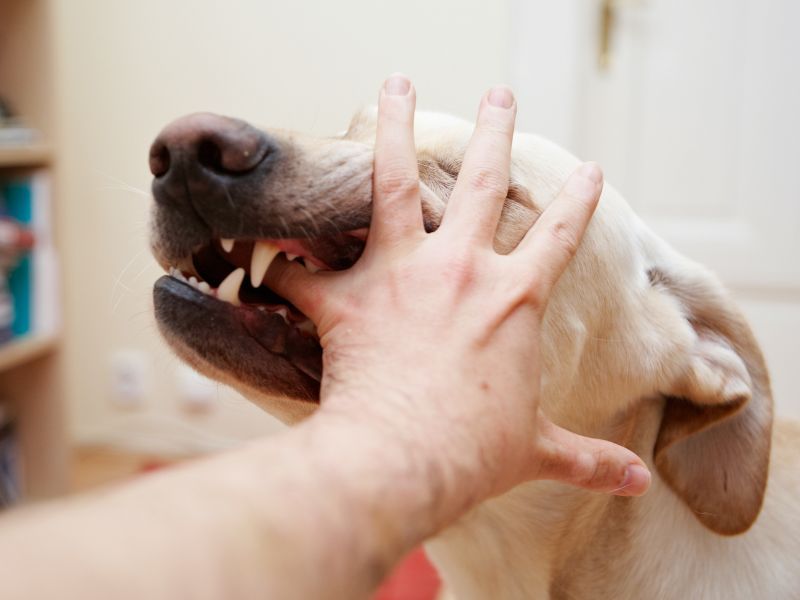
When Labrador puppies start biting, it’s normal for owners to worry about signs of aggression. Common behaviors like nipping, growling, resource guarding, and stiff posture can be concerning. However, it’s important to remember that not all of these behaviors indicate aggression; some are just part of typical puppy play. Labrador puppies, like other breeds, tend to bite and growl during playtime. This behavior is a natural part of their development and not a sign of aggression. Biting is a phase puppies go through before learning proper social skills. As long as the biting doesn’t break the skin or cause bleeding, it’s unlikely due to dominance or aggression. To determine if your Labrador puppy is truly aggressive or just displaying normal puppy behavior, watch for warning signs like snarling, lunging, and forceful biting. If you notice these signs, it’s important to address the issue promptly while the puppy is still young and easier to train. To tackle puppy aggression, focus on providing training, socialization, and using positive reinforcement techniques. Consulting with a professional dog trainer or behaviorist can also be beneficial. Remember, aggressive behavior in Labradors won’t go away on its own, so taking action is crucial for your puppy to grow into a well-behaved adult dog. Labrador puppies’ growling and biting phase is common and not necessarily a sign of aggression. Instead of punishing them, focus on redirecting and training techniques to minimize this behavior. Socialization, positive reinforcement, redirection, and providing clear boundaries are key strategies to address growling effectively. Labrador puppies are known for their playful nature, with mouthing and biting being a typical part of their development. Normal play behaviors like the “play bow” and open-mouthed play indicate healthy interactions. Teething also contributes to biting behavior in puppies, so it’s essential to teach them to control their biting to ensure they grow into well-behaved, sociable adult dogs. Training a puppy to stop biting takes patience and consistency, focusing on stopping painful bites first before addressing mouthing entirely. Remember that positive reinforcement is crucial in helping your Labrador puppy learn appropriate play behavior.
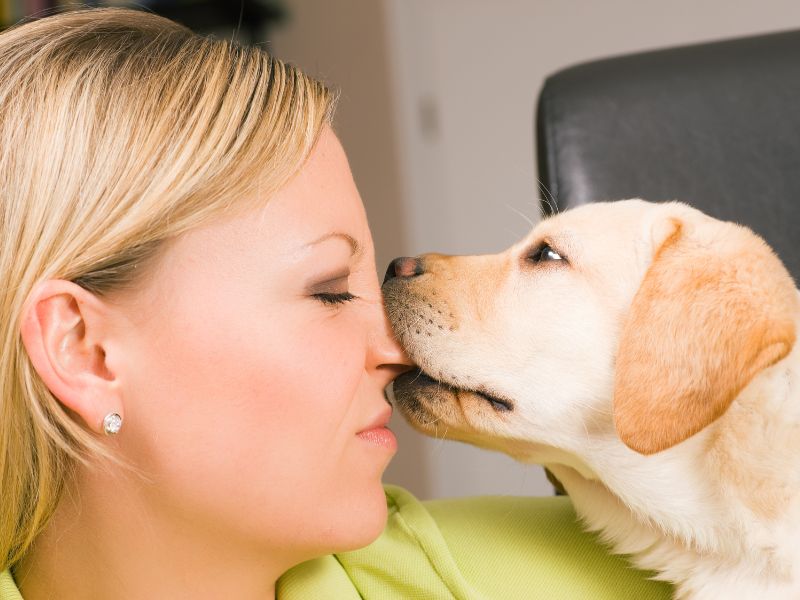
Labrador puppies usually begin to outgrow their biting phase between 7 to 8 months of age, once they have their full set of adult teeth. While this process typically occurs naturally, some puppies may require training to prevent excessive biting, which can lead to behavior issues later on. It’s important to recognize that biting is a normal part of puppies’ development as they explore, play, and learn social skills with their littermates. Teaching them bite inhibition is crucial for their socialization and safety as adult dogs. To discourage biting behavior, owners can redirect their puppy’s attention to appropriate toys, yelp or withdraw attention when bitten, and use positive reinforcement for good behavior. Each puppy is different, so patience and consistency are key in teaching them not to bite. Biting behavior can worsen if puppies are rewarded with attention for biting or have poor bite inhibition skills. Owners should avoid reinforcing biting behavior and provide suitable alternatives, such as chew toys. Teaching proper bite inhibition through play and feedback is vital for puppies to learn appropriate biting strength. During the teething phase, which typically starts around 3 to 4 months of age, puppies may chew more to alleviate discomfort from emerging teeth. Providing teething toys can help them cope with this stage, ensuring they don’t chew on inappropriate objects that could harm their teeth. It’s important to monitor puppies during playtime and guide them towards suitable biting outlets to prevent potential injuries. With patience and understanding, owners can help their Labrador puppies navigate through the teething phase and develop good bite inhibition skills for a well-behaved adult dog.
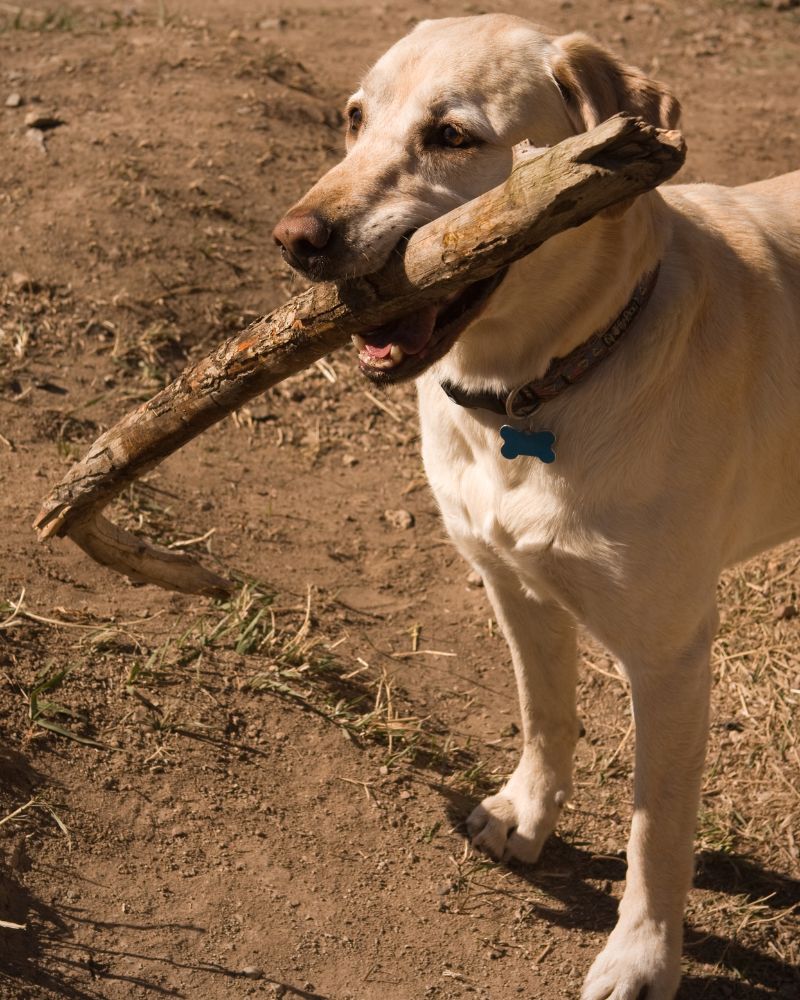
Labrador puppies are famous for being playful and curious, which can sometimes lead to them nipping and biting. To help your Lab puppy grow into a well-behaved adult, it’s important to work on bite inhibition early in their life. Renowned dog trainer Pippa has some great advice on how to tackle this common puppy behavior. Pippa highlights the fact that biting and nipping are natural behaviors for puppies as they explore and learn about their environment. It’s crucial to be patient and consistent when training your puppy. One of Pippa’s suggestions is to imitate how a puppy’s littermates would react during play. If your puppy bites too hard, let out a high-pitched yelp or shout “Ouch!” to show that the force is not acceptable. When they release their grip, refrain from pulling your hand away, as this could trigger a chase response. Here are some more of Pippa’s tips to help your Lab puppy stop biting: Redirect the biting: Offer your puppy a chew toy or rawhide stick as a suitable alternative to keep them entertained and content. Positive reinforcement: Praise or reward your puppy when they show good behavior, like avoiding biting during playtime. Time-outs: If your puppy continues to bite, give them a short time-out to calm down and understand that biting leads to a loss of attention. Socialization: Expose your Lab puppy to different people, animals, and settings to enhance their bite inhibition and overall behavior. Remember that teething can increase biting tendencies due to discomfort. Providing cold chew toys can help alleviate their sore gums and redirect their biting behavior. Stay patient and consistent with your training efforts, and you’ll see progress in your puppy’s bite inhibition over time. Dealing with biting in 9- or 10-week-old Labrador puppies requires patience, redirection, and consistent communication. Proper socialization and training will help them outgrow this phase and become well-behaved companions.
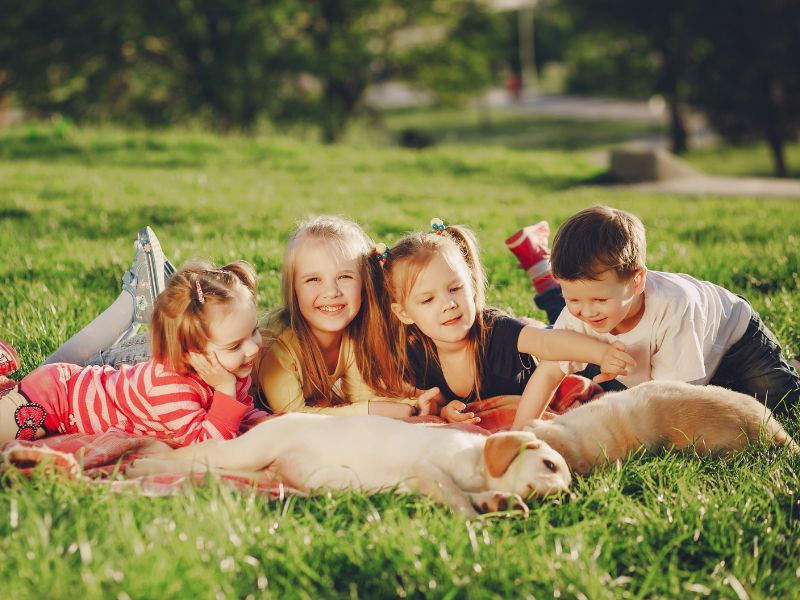
To prevent biting behavior in Labrador puppies, it is important to supervise their interactions with young children and use barriers like baby gates when necessary. Encourage calm play to avoid overexcited biting and teach children not to pull on the puppy’s tail or fur. When introducing your puppy to new visitors, maintain a calm environment and provide chew toys to prevent biting. Consistent training and positive reinforcement are key to curbing unwanted biting behaviors. Remember that biting is a natural phase for puppies, so be patient and provide gentle guidance during the training process. It is essential not to worsen the situation by reacting harshly or encouraging biting during playtime. Redirect your puppy’s attention to appropriate chew toys and set clear boundaries to prevent biting from becoming a bad habit. Gradually teach your puppy to control the intensity of their bites and avoid punishing them for biting. Use positive reinforcement and distractions, like toys or treats, to redirect their attention when needed. With patience, consistency, and understanding, you can help your puppy grow into a well-behaved adult dog.
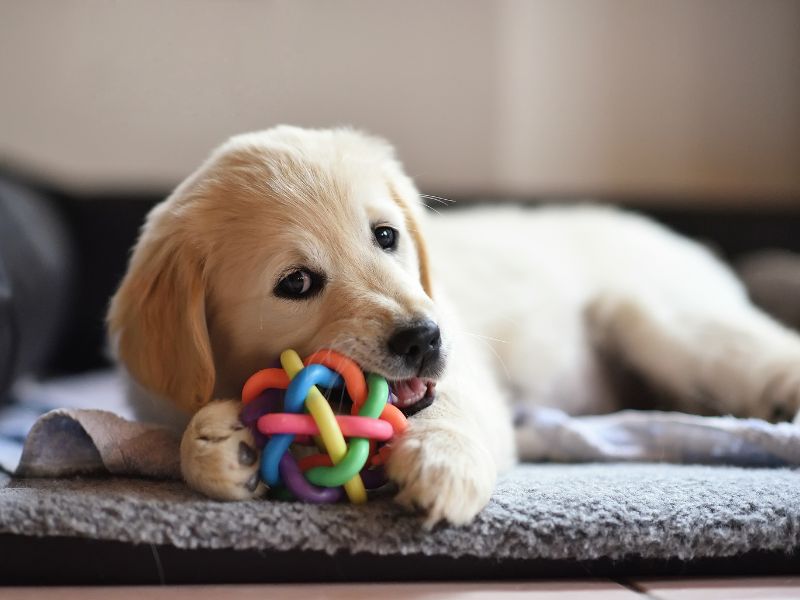
One effective way to prevent your Labrador puppy from biting hands is by providing them with distractions. Offer your puppy appropriate chew toys to redirect their attention and satisfy their natural urge to bite and chew. This helps teach your puppy that biting toys is acceptable, while biting hands is not. It is important to praise and reward your puppy when they choose the toy over your hand. This positive reinforcement will help discourage biting in the future and encourage healthy habits. Using a houseline is another useful technique for addressing biting behavior in Labrador puppies. A houseline is a light and long leash that remains attached to your puppy while indoors. It allows you to intervene and manage your puppy’s behavior with minimal disruption. When your puppy starts biting your hand or engaging in unwanted behavior, gently tug on the houseline to redirect their attention to a more appropriate activity or toy. Consistently using the houseline helps your puppy understand that biting hands will not lead to attention and play. Patience and consistency are key when implementing these methods. With time, your Labrador puppy will grasp boundaries and develop bite inhibition, becoming a well-behaved and happy companion. In the fourth stage of training, focus on teaching your Labrador puppy not to bite using a straightforward exercise. The goal is to show your puppy that biting results in the end of the game and encourages them to control their mouthing behavior. During the training exercise, hold a small treat in your fist and offer it to your puppy. Ignore their attempts to bite and wait for them to stop. When they do, praise them verbally and reward them with the treat. Repeat this exercise multiple times a day to reinforce the positive behavior of not biting. If your puppy continues to mouth at you, stop all interaction immediately, provide a safe chew toy or alternative stimulation, and resume the training exercise once they have calmed down. Be patient and consistent, as it may take time for your puppy to understand and inhibit their biting behavior. Labrador puppies enjoy playing, but their biting can be concerning. It is crucial to teach them how to play safely and develop healthy habits early on. Encourage safe play by introducing toys and games, teaching bite inhibition, establishing boundaries, using redirection, and providing positive reinforcement. With patience and the right techniques, your Labrador puppy will learn to play safely and enjoy interactions without excessive biting. Remember that every puppy is unique, so finding the right approach will help them become a well-behaved and playful adult dog.
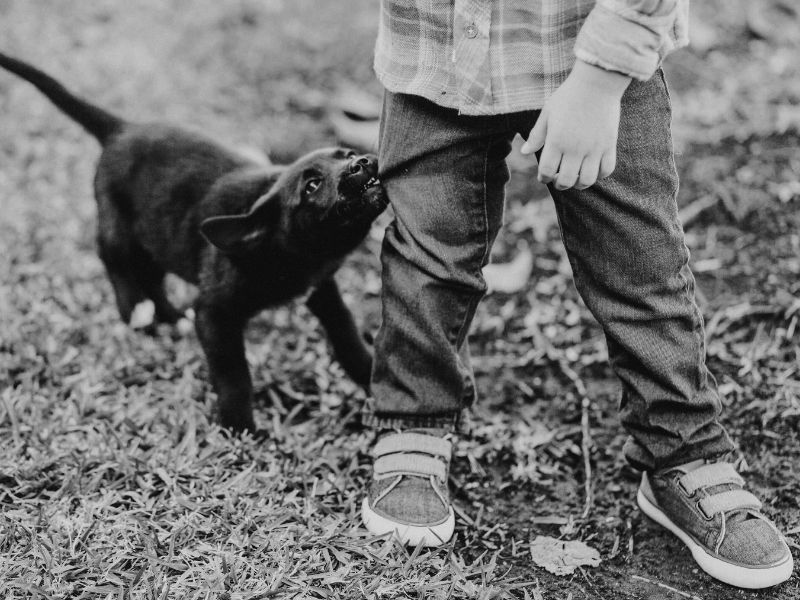
Labrador puppies, like all pups, go through a teething phase as they grow up. This usually starts around 3-4 months and continues until they have all their adult teeth by about 7 months old. During this time, puppies naturally bite as their teeth grow in, but also to play and explore their surroundings. It’s important to remember that biting is normal behavior for young pups as they try to interact with their environment. As they mature, their biting habits will decrease, and they will learn more appropriate ways to engage with their surroundings. For Labrador puppies, the biting phase may end when they finish teething, or it could continue until they reach maturity between 2-4 years old. To help your pup stop biting during teething, redirect their biting to chew toys and reward good behavior. In the meantime, training your puppy to stop biting is crucial. Use techniques like making a loud noise to stop them or withdrawing attention if they bite. Consistent training, redirection, exercise, and mental stimulation will help your Labrador pup develop good habits and eventually stop biting altogether.


